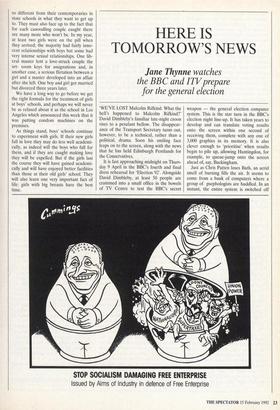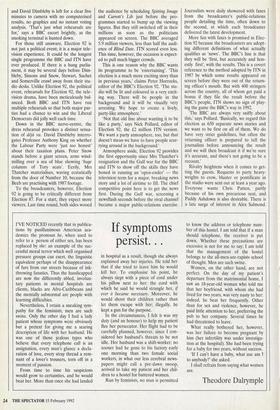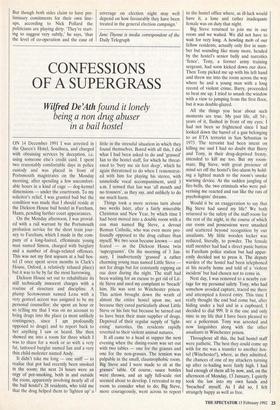HERE IS TOMORROW'S NEWS
Jane Thynne watches the BBC and ITV prepare for the general election
'WE'VE LOST Malcolm Rifkind. What the hell's happened to Malcolm Rifkind?' David Dimbleby's familiar late-night croon rises to a petulant bellow. The disappear- ance of the Transport Secretary turns out, however, to be a technical, rather than a political, drama. Soon his smiling face leaps on to the screen, along with the news that he has held Edinburgh Pentlands for the Conservatives.
It is fast approaching midnight on Thurs- day 9 April in the BBC's fourth and final dress rehearsal for 'Election 92'. Alongside David Dimbleby, at least 50 people are crammed into a small office in the bowels of TV Centre to test the BBC's secret
weapon — the general election computer system. This is the star turn in the BBC's election night line-up. It has taken years to develop and can translate voting results onto the screen within one second of receiving them, complete with any one of 3,000 graphics in its memory. It is also clever enough to 'prioritise' when results begin to pile up, allowing Huntingdon, for example, to queue-jump onto the screen ahead of, say, Buckingham.
Just as Chris Patten loses Bath, an acrid smell of burning fills the air. It seems to come from a bank of computers where a group of psephologists are huddled. In an instant, the entire system is switched off and David Dimbleby is left for a clear five minutes to camera with no computerised results, no graphics and no instant voting analysis. 'That's just what rehearsals are for,' says a BBC escort brightly, as the smoking terminal is hunted down.
For those still unaware, Election 92 is not just a political event; it is a major tele- vision experience. It could be the longest single programme the BBC and ITN have ever produced. If there is a hung parlia- ment, it may be several days before Dim- bleby, Sissons and Snow, Stewart, Suchet and Somerville crawl away from their stu- dio desks. Unlike Election 92, the political event, rehearsals for Election 92, the tele- vision drama, have been meticulously bal- anced. Both BBC and ITN have run multiple rehearsals so that both major par- ties had a chance to win and the Liberal Democrats did jolly well each time.
Down in the BBC nerve-centre, the dress rehearsal provokes a distinct sensa- tion of deft) vu. David Dimbleby interro- gates Professor Anthony King on whether the Labour Party were 'just too honest' about their taxation plans. Peter Snow stands before a giant screen, arms wind- milling over a sea of blue showing 'huge columns of Tory seats'. Eerily, Mrs Thatcher materialises, waving ecstatically from the door of Number 10, because the Beeb are practising with 1987 footage.
To the broadcasters, however, Election 92 is going to be critically different from Election 87. For a start, they expect more viewers. Last time round, both sides wooed
the audience by scheduling Spitting Image and Carrott's Lib just before the pro- grammes started to bump up the viewing figures. But they still switched off in their millions as soon as the politicians appeared on screen. The BBC averaged 5.9 million viewers, less than half the audi- ence of Blind Date. ITN scored even less. This time, however, the occasion is expect- ed to pull much bigger crowds.
This is one reason why the BBC wants its programme to be 'entertaining'. 'This election is a much more exciting story than in previous years,' claims Peter Horrocks, editor of the BBC's Election 92. The stu- dio will be lit and coloured in a very excit- ing way. There will be people in the background and it will be visually very arresting. We hope to create a lively, party-like atmosphere.'
`Not that old line about wanting it to be like a party,' says Nick Pollard, editor of Election 92, the £2 million ITN version. We want a party atmosphere, too, but that doesn't mean we have to have people scur- rying around in the background.'
Atmosphere aside, Election 92 provides the first opportunity since Mrs Thatcher's resignation and the Gulf war for the BBC and ITN to show off the skills they have honed in running an 'open-ender' — the television term for a major, breaking news story and a lot of airtime to fill. The chief competitive point here is to get the news first. During the Gulf war, screening a newsflash seconds before the rival channel became a major public-relations exercise. Journalists were daily showered with faxes from the broadcaster's public-relations people detailing the time, often down to the second, at which each broadcaster delivered the latest development.
More fun with faxes is promised in Elec- tion 92 because the broadcasters are adopt- ing different definitions of what actually qualifies as 'news'. The BBC's line is that they will be 'first, but accurately and hon- estly first', with the results. This is a covert reference to the method adopted by ITN in 1987 by which some results appeared on screen before they were out of the return- ing officer's mouth. But with 400 stringers across the country, all of whom get paid a bonus if they file the result before the BBC's people, ITN shows no sign of play- ing the game the BBC's way in 1992.
`The BBC are always very sniffy about this,' says Pollard. 'Basically, we regard this election as 650 separate news stories and we want to be first on all of them. We do have very strict guidelines, but often the returning officer is prepared to tell the journalists before announcing the result and we will then broadcast it if we're sure it's accurate, and there's not going to be a recount.'
Rivalry heightens when it comes to get- ting the guests. Requests to party heavy- weights to crow, bluster or pontificate in the studio were sent out at least a year ago. Everyone wants Chris Patten, partly because of his own precarious seat, and Paddy Ashdown is also desirable. There is a late surge of interest in Alex Salmond. But though both sides claim to have pre- liminary comitments for their own line- ups, according to Nick Pollard the politicians are playing dirty. `They're start- ing to suggest very subtly,' he says, `that the level of co-operation and the ease of coverage on election night may well depend on how favourably they have been treated in the general election campaign.'
Jane Thynne is media correspondent of the Daily Telegraph




























































 Previous page
Previous page